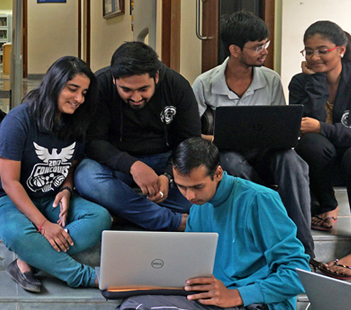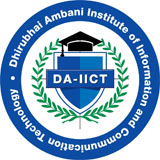| Award | Duration | Study Mode |
|---|---|---|
| M.Sc. Data Science | 2 Years (4 semesters) | Full Time (on campus) |
| Intake | Selection Process | Program Starts |
|---|---|---|
| 60 seats | Entrance Test | Yearly in July |
- displayNone About the Program
- displayNone Entry Requirements
- displayNone Curriculum Overview
- displayNone Semester-wise Courses
- displayNone Teaching and Learning
- displayNone Career Outcomes
- displayNone Fee & Scholarships
- displayNone How to Apply
- displayNone Essential Documents
 The M.Sc. in Data Science at DA-IICT brings together computational and statistical skills for effective data-driven problem-solving. This full-time program equips students with the analytical tools to design advanced technical solutions, emphasizing modern computational methods and rigorous statistical thinking.
The M.Sc. in Data Science at DA-IICT brings together computational and statistical skills for effective data-driven problem-solving. This full-time program equips students with the analytical tools to design advanced technical solutions, emphasizing modern computational methods and rigorous statistical thinking.
Designed for those seeking to begin or advance their careers in data science, this professional master’s program welcomes students from various disciplinary backgrounds. Core courses provide a fundamental understanding of data science, covering key areas such as machine learning, data analysis, and data engineering while addressing data science's ethical and legal implications.
Our industry-relevant curriculum ensures students gain the skills to extract valuable insights from big data. Throughout the program, students will develop expertise in statistical modeling, data engineering, machine learning, data visualization, software engineering, research design, data ethics, and user experience. This comprehensive training meets the growing demands of industry, non-profits, government agencies, and other organizations.
To apply for the M.Sc. in Data Science program at DA-IICT, candidates must meet the following criteria:
Educational Qualifications
The candidate must possess one of the following qualifications.
- Bachelor’s Degree in Science:
- From a recognized university with a minimum aggregate of 60% or its equivalent.
- Accepted disciplines: Statistics, Mathematics, Physics, Computer Science, Economics, Econometrics, Operational Research.
- Bachelor’s Degree in Engineering or Technology:
- From a recognized university with a minimum aggregate of 60% or its equivalent.
- Accepted disciplines: Computer Science, Information Technology, Electronics, Electronics and Communication, Electrical Engineering.
- Other Degrees:
- Candidates holding BCA, B.Sc. (IT), B.Sc. (AI/ML), and B.Sc. (Data Science) degrees with a minimum aggregate of 60% or its equivalent.
Additional Requirements
- Must have passed the 12th standard with Mathematics as a main subject.
- Candidates appearing in their final degree examination and expecting to complete it by July 2024 may also apply. However, their final admission will be subject to obtaining a minimum aggregate of 60% marks or its equivalent. All admitted candidates must submit their degree certificates or proof of completion by 30 October 2024. Failure to do so may result in cancellation of their admission.
Notes
- The decision of the concerned authorities of DA-IICT regarding the eligibility of any candidate shall be final.
- There is no age limit applicable to this program.
We welcome diverse and qualified applicants who are eager to advance their careers in data science.
Industry-Relevant Curriculum
Data science is a fast-evolving field, and our curriculum is designed to equip students with the skills needed to meet the advancing needs of tomorrow. Master the essentials of Data Science through our diverse curriculum, covering all six pillars of data science: Mathematics, Statistics, Programming, Data Engineering, Machine Learning, and Ethics & Communication.
Program Breakdown
The M.Sc. Data Science is a 76-credit program, comprising:
- Core Courses:
- 2 Core Mathematics courses (7 credits)
- 2 Core Statistics courses (8 credits)
- 1 Core Programming course (4 credits)
- 2 Core Data Engineering courses (8 credits)
- 3 Core Machine Learning courses (12 credits)
- 1 Core Ethics course (3 credits)
- Elective Courses:
- 8 credits, including courses from domain-specific applications.
- Value-Added Courses:
- 4 credits, taught by industry experts.
Project and Internship Opportunities
All students undertake a data science minor project (6 credits) under the guidance of a professor at DA-IICT. This project starts in the summer and concludes by the end of the third semester, focusing on a practical data science research question, either individually or as a team of two to three students.
For those seeking hands-on experience in a science and technology workplace or with research, the program offers a 6-month internship or the option to complete a major (research) project.
This comprehensive curriculum ensures that graduates are well-prepared to tackle the challenges and opportunities in the field of data science.
| Serial No. | Course Name | Credits (L-T-P) |
|---|---|---|
| 1 | Mathematical Foundations for Data Science | 4 Credits (3-1-0) |
| 2 | Statistical Methods | 4 Credits (3-0-2) |
| 3 | Data Structures and Algorithms in Python | 4 Credits (3-0-2) |
| 4 | Introduction to Data Management | 4 Credits (3-0-2) |
| 5 | Fundamentals of Machine Learning | 4 Credits (3-0-2) |
| Total Semester Credits | 20 Credits (15-1-8) | |
| Serial No. | Course Name | Credits (L-T-P) |
|---|---|---|
| 1 | Numerical Optimization | 3 Credits (2-0-2) |
| 2 | Interactive Data Visualization | 4 Credits (3-0-2) |
| 3 | Big Data Engineering | 4 Credits (3-0-2) |
| 4 | Neural Networks & Deep Learning | 4 Credits (3-0-2) |
| 5 | Technical Elective - 1 | 4 Credits (3-0-2) |
| Total Semester Credits | 19 Credits (14-0-10) | |
| Serial No. | Value Added Courses (compulsory): Total 60 hrs. | Credits (L-T-P) |
|---|---|---|
| 1 |
|
4 Credits (1-0-6) |
| 2 | Minor Project* | 2 Credits (0-0-4) |
| Total Semester Credits | 6 Credits (1-0-10) | |
| Serial No. | Course Name | Credits (L-T-P) |
|---|---|---|
| 1 | Machine Learning Systems Engineering | 4 Credits (3-0-2) |
| 2 | Data Science Ethics | 3 Credits (3-0-0) |
| 3 | Technical Elective - 2 | 4 Credits (3-0-2) |
| 4 | Minor Project (Continued…) | 4 Credits (0-0-8) |
| Total Semester Credits | 15 Credits (9-0-12) | |
| Serial No. | Course Name | Credits (L-T-P) |
|---|---|---|
| 1 | Industrial Training/ Major Project (Pass/ Fail) | 16 Credits (0-0-32) |
| Total Semester Credits | 16 Credits (0-0-32) | |
List of Electives
|
|
Faculty Expertise
Gain access to faculty with global experience and doctorates from prestigious institutions such as the University of Toronto, Carnegie Mellon University, University of Chicago, IITs, and other top universities worldwide. Our professors collaborate with industry and government to address real-world issues and integrate their research into the classroom. Additionally, teaching is complemented by sessions conducted by industry experts, providing students with practical insights and knowledge.
Peer-Learning Clubs (PLCs)
Engage with student-led learning communities that promote collaboration and a sense of belonging. These Peer-Learning Clubs (PLCs) enrich students’ academic journey by fostering a supportive and interactive learning environment.
Emphasis on Holistic Development
Experience a hands-on learning approach with regular assessments designed to ensure a well-rounded education. Our teaching methods include:
- Surprise quizzes
- Group projects
- Case studies
- 100-minute development challenges
- Teach-the-teacher exercises
These activities are designed to enhance students' critical thinking, problem-solving, and communication skills, preparing them for the dynamic field of data science.
Outstanding Job Placement Success
Graduates of the M.Sc. in Data Science program at DA-IICT enjoy remarkable job placement success across a variety of roles, including: Data Scientist, Data Engineer, Data Analyst, Quantitative Analyst, Machine Learning Engineer, and Software Developer.
Our program boasts a noteworthy placement record within our postgraduate programs over the past years.
Employers in the Field
Our graduates are highly sought after by leading organizations across various sectors, including:
- Consulting Firms: EY, KPMG, Futures First
- Financial Services Companies: American Express, GiftStreet Capital
- IT Companies: SAS R&D, Micron Semiconductor, Amazon Development Centre, Colgate Global, and many more.
- Government Departments and Organizations: Indian Space Research Organisation (ISRO)
- Universities and Public Research Institutions: IIT Gandhinagar, IIT Delhi, IIIT Hyderabad, CSIR, IPR, etc.
Technical and Professional Skills
Upon graduating from the program, students will possess a robust knowledge of modern statistical methodology and computing, equipping them for successful careers in data science.
Graduates will be able to demonstrate advanced critical analysis and independent inquiry skills, maintain intellectual integrity, and apply modern statistical methods and computing effectively. They will excel in writing, research, problem-solving, and communication, foster creative and critical thinking, and drive positive changes in their communities and workplaces.
Further Study
Upon completing the M.Sc. in Data Science, students may qualify to undertake a PhD (Doctor of Philosophy) in India or abroad, further enhancing their expertise and career prospects.
Fee
At the time of counselling an amount of Rs. 1,80,000 (Rs. 1,50,000/- towards Tuition Fee for the First Semester, Rs. 5,000 for Value Added Courses, and Rs. 25,000/- towards a Caution Deposit) - The registration fee is payable at the time of registration and hostel rent on allotment of the hostel room.
| Tuition fee | Rs. 1,50,000 per Semester |
| Value Added Courses | Rs. 5,000 per Semester |
| Registration Fee | Rs. 2,500 per Semester (including summer semester) |
| Caution Deposit | Rs. 25,000 (Refundable at the end of the program) |
| Hostel Rent | Rs. 35,000 per semester |
| Food | On actuals. There are multiple food options available in the campus (The expense will be approximately Rs. 5,500 per month) |
Subject to revision every Academic Year from 8 to 10%.
Education Loan
The Institute will facilitate the students to avail educational loan from selected Banks. The bank officials will be present on campus at the time of registration of admitted students to enable the students to obtain details on procedures and terms and conditions of the loan. The students can also avail loan from banks of their choice, and in either case, the Institute will extend support in completing the loan documentation process.
Refund Policy
The refund policy for the withdrawing candidates will be in accordance with the UGC rules.
Merit & Merit-cum-Means Scholarships
The Institute provides financial support in the form of scholarships to eligible students. More details of it can be seen here.
PG Scholarships - Fellowships: Click here
The following links will be activated soon.
- Academic Requirements
- Detailed Syllabi of the Courses
- Minor Project Policy
- Minor Project Poster Template
- Major Project Thesis Template

